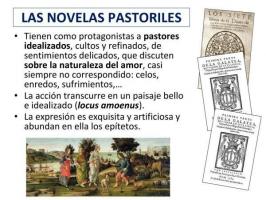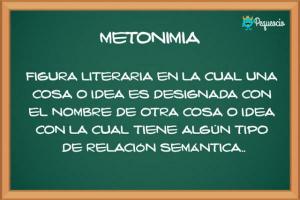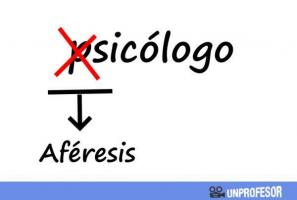What is LITERATURE: types and characteristics
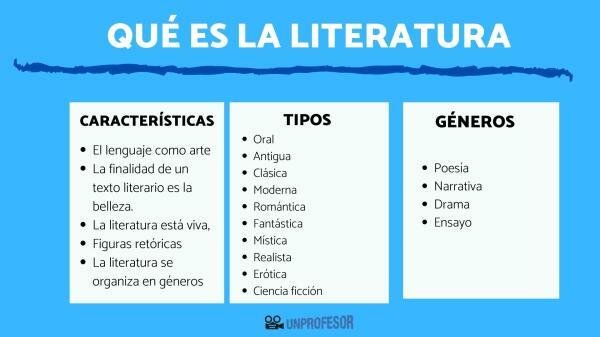
Literature is an artistic manifestation in which the use of word and language in all its breadth and can be presented, both in written and oral form. It is an art that entertains, instructs and amuses, turning ideas, stories or ideas into a beautiful way to communicate.
In this lesson from a PROFESSOR we want to explain in detail what is literature, what characteristics does it have and what are the types of literature that have been developed throughout history.
At Dictionary of the Royal Academy of the Spanish Language, we are told that literature is:
"The art of verbal expression"
Literature is considered one of the oldest forms of art, therefore, is a way of seeking beauty through words, whether written or oral.
Most of the literature we know is written and we can find it in books, magazines, notebooks, etc. Not all writing is literature, since it has to have a series of characteristics that make it an artistic expression as such.
Over the years, these fees to accept what literary texts really are, have been evolving and in this article we will show you the requirements that a text must have, in order for it to be considered literature. Although you should bear in mind that there are still
multiple definitions about the literary concept.It is still difficult to determine what is literature and what is not, since this discipline has accompanied man practically since the beginning of its existence and it was later when the concept was defined. Therefore, we can say that literature existed before the word "literature".
You can easily identify a literature text by its literary language, before starting to analyze if it meets the necessary characteristics to be recognized as art. Literary language is used in this type of work and is quite different from the colloquial or ordinary, which is the one you're reading right now.
To see it more clearly, we leave you with An example of the same phrase written colloquially and in literary language, so that you can quickly recognize the differences between the two:
- literary language: He Fought like a lion against his illness. His heart turned into a rock from that day on.
- Colloquial or ordinary language: He overcame the disease after having fought a lot. Since that day, it is very difficult for him to show his feelings and he is always more distant with the people he loves.
The use of language in literature always look for beauty, using a suitable rhythm to be read and adding rhetorical figures that trigger the reader's imagination.
In literature, completely imaginary events can be explained, the product of the author's mind or real events, although always passing through the filter of writer's subjectivity. Literature is a very extensive field of study and then we are going to explain the essential features that you need to know.
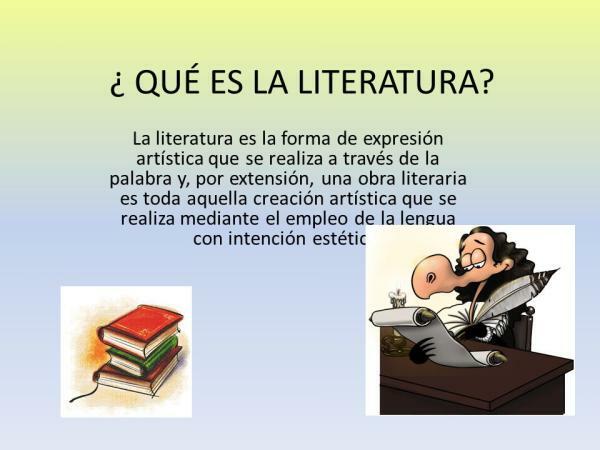
As we mentioned before, there are many different definitions about literature and depending on the culture, some texts are considered literary and others lack the necessary requirements.
These are the basic characteristics that bring together all the literary texts and that will help you analyze each of your readings:
- Focuses on the language as art, therefore, each one of the sentences will have an aesthetic beauty that will be part of a set in which the rhythm and the forms will have a lot of relevance.
- In the past, literature was only available to a few, but from the moment that the publishing press appeared and the population became massively literate, literary products have become of daily consumption.
- The purpose of a literary text is the beauty.
- Literature She is alive, therefore, what was once considered literature, may not be so now and vice versa.
- use different rhetorical figures throughout the narrative of history.
- Literature organized into genres and has evolved over time. While in the past we talked about the 3 great genres of literature (epic, tragedy and lyric), today Today, this artistic discipline is made up of quite different genres (narrative, dramaturgy, poetry and drama). test).
- The author regularly resorts to his imagination or fantasy to create the works.
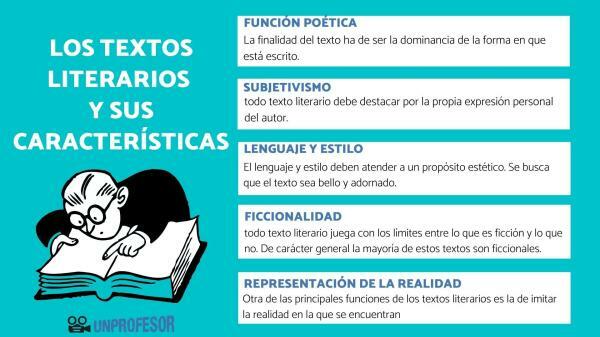
Literature is difficult to classify, since within the same text different forms of writing can be used and different topics can be discussed. That is why the most common way of grouping literary texts is starting from the time or current to which they belong:
- oral literature: It exists even before written literature and are all those forms of art that use language as the main medium and that have been transmitted orally from generation to generation.
- ancient literature: They belong to the Ancient Age. Most of the texts are of a religious or ritual nature, although there are also narratives about epic events of the time.
- Classic literature: They belong to the civilization of the Roman Empire or the Greek Empire.
- modern literature: Are those literary texts that were written in the Contemporary Age (19th and 20th centuries).
- avant-garde literature: It belongs to the avant-garde trend that was based on constantly finding new ways of expressing and new ways of making art.
- romantic literature: It is the literature that was written at the time of Romanticism. It should not be confused with literature dealing with love themes, although they may sometimes be linked. In this type of literature, the author's subjectivity, beauty and emotions are prioritized as the engine that allows us to be alive.
- Fantastic literature: Fantasy literature is one that is based on the real world and in a specific time, but the actions are far from the physical laws that govern day to day.
- mystical literature: It is one that deals with religious issues and that even being literary texts work as reference books for some groups of people in society. The books we have in Christianity are part of mystical literature.
- realistic literature: These are texts that could be taking place in the real world, since they are based on specific places and times that have really existed. Even so, the characters do not have to be real people or have lived through the same situation as in the text.
- erotic literature: This type of literature is based on recounting erotic or sexual episodes, in a suggestive way.
- science fiction literature: This literature is the one based on the society of the moment, but set in an unreal world, often futuristic and much more technologically developed than the author's today.
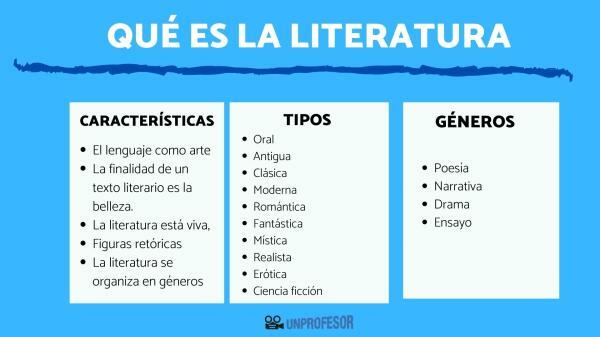
The literary genres are another way of classifying literature that is not based on the time or theme of the texts, but rather focuses solely on its form. Each of the genres that we will show you below has some rules to be followed by the author, when composing his works.
Although there are writers who break the rules and that is what makes literature alive and in constant movement. Formerly, the three genres by which literature was governed were epic, tragedy and lyrical, but currently we rely on the four modern genres of classification of literary works.
Poetry
Initially, the poetry was written in rhymed verses and with a very specific metric, although now the free poetry. It is a genre in which the main theme is the feelings of a character and the author is completely free to use the literary resources that he needs. The reader will not always understand the full meaning of each of the verses, but can create their own interpretation of it.
Narrative
The main characteristic of this genre is that it must be explained by a narrator, either a character or someone external to the work. Real or fictitious stories are told with the aim of entertaining the reader and it is one of the older genres in the history of mankind.
can be distinguished three subgenres Major in the narrative:
- Tale: A simple narrative that is read in one sitting.
- Novel: Complex narrative involving numerous characters and different plots are linked.
- Chronicle: It is a fairly new narrative genre in which real events that have happened are explained, using literary language. This genre is very clear in diaries or texts made up of letters of correspondence.
Dramaturgy
The drama or dramaturgy are the written compositions, originated to be standing up in the theater and spoken aloud by some characters. These works do not have a narrator, but are based on direct dialogue between each of the characters involved in the scenes.
Test
The literary essay It is a type of literature that has the objective of make reflection the reader about a topic. The author chooses a theme and develops it deeply, offering reliable information and conclusions about an initial question that might arise.
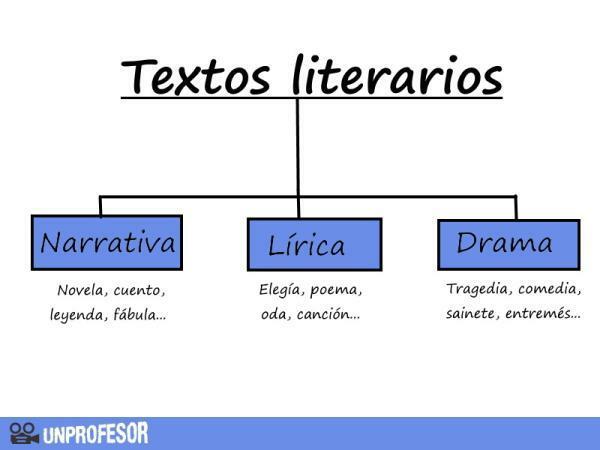
Literature is the art that uses one of the most used tools by the human being since the beginning of time: the language. Throughout history, literature has been present as a mirror of society and thanks to it it has been possible to discover what life was like in other times or in other cultures.
In addition, this artistic expression has served as fighting form to bring about profound changes in the culture and way of thinking of society.
We hope that this article has been able to help you and that now you have much more clarity what is literature, the characteristics that it has and what are the types of literary language that exist. If you want to continue learning about this topic, do not hesitate to take a look at the literature section.

